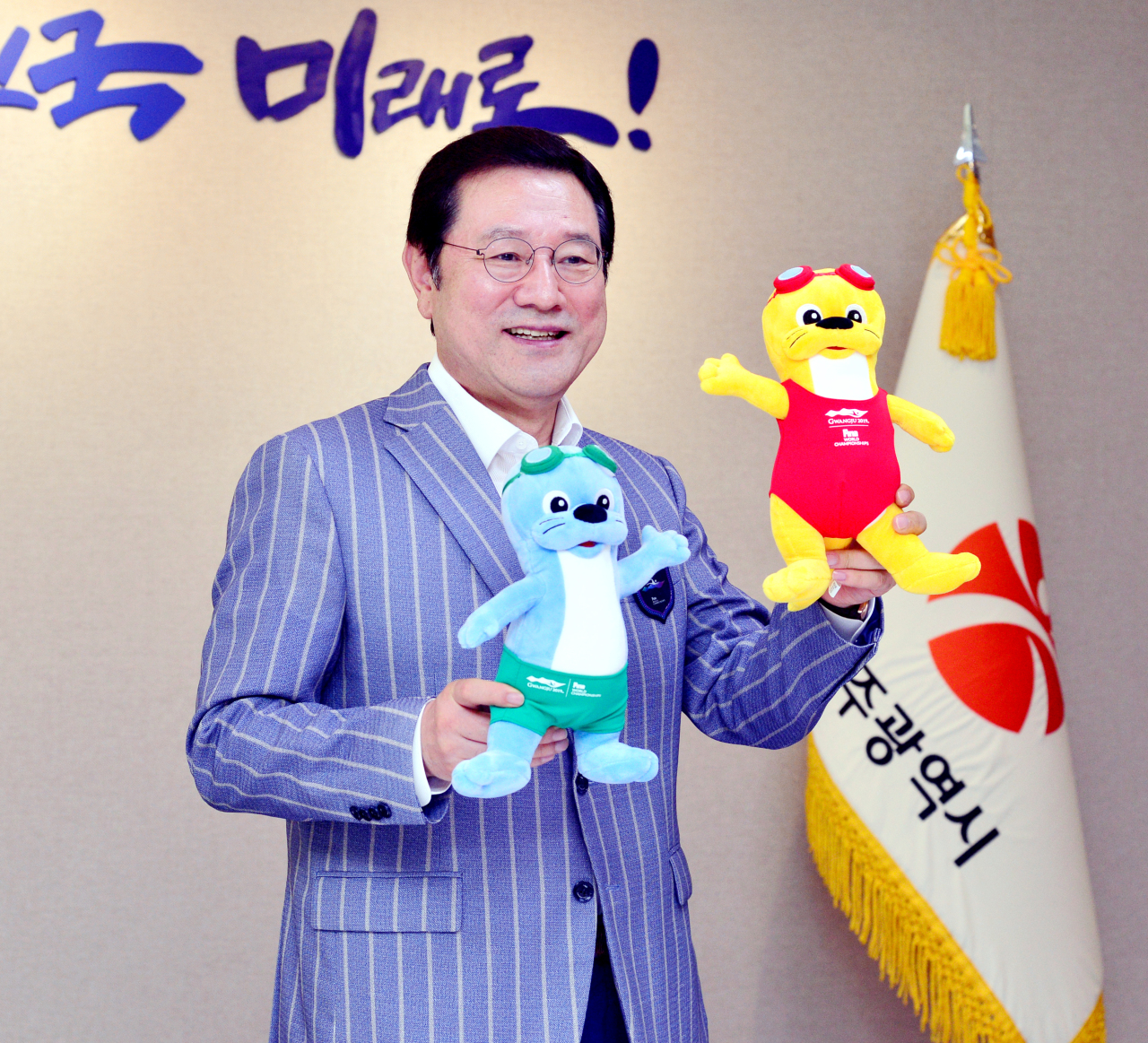GWANGJU -- Gwangju Metropolitan City is well known as the site of the May 1980 Democratization Movement and a “city of gastronomy” for its savory dishes.
The southwestern city is now poised to become a “city of water sports” as it hosts the 2019 FINA World Aquatics Championships.
With a record 72,000 people -- professional and amateur athletes, members of the media and related officials -- from 193 countries participating, the 18th biennial championships look set to bolster Gwangju’s presence in the international sports arena.
In hosting the FINA World Championships Gwangju, South Korea has become the fourth country -- following Germany, Italy and Japan-- to host five of the most popular international sports events, including the Summer Olympics, Winter Olympics, World Cup and World Championships in Athletics.
“The most important factor now is public participation and interest,” said Gwangju Mayor Lee Yong-sup in an interview with The Korea Herald on Tuesday at the mayor’s office in Gwangju. Lee is also chief of the championships’ organizing committee.
As of Thursday, 315,000 tickets totaling 7.1 billion won ($6 million) had been sold, reaching 95 percent of the goal of 7.5 billion won in ticket sales.
The attendance of North Korean athletes at the event would have drawn more attention to Gwangju, but this seems unlikely for now.
“The slogan (of the championships) is ‘Dive into Peace.’ North Korea has not responded up until now. This is regrettable. But we have agreed to accept North Korean athletes if they show up before the opening ceremony. Their rooms at the athletes’ village and seats at the opening ceremony have been reserved,” Lee said.
The championships for professional athletes takes place July 12-28, with athletes competing in 63 competitions across six disciplines -- swimming, diving, water polo, artistic swimming, open water and high diving.
Amateur athletes aged 25-100 will compete in the FINA World Masters Championships from Aug. 5-18.
Lee highlighted safety as the top priority in the lead-up to and during the games.
“We are putting in a lot of effort to ensure top-notch safety. Safety is the most important thing. By safety I mean safety from terror, natural disasters -- such as heat waves, heavy rain and typhoon -- infectious diseases, and food poisoning, among others. Maintaining public safety is also crucial,” Lee said
He added that related government agencies, including the National Intelligence Service, police and the Ministry of Food and Drug Safety, are to cooperate for maximum safety.
“The championships should not end as a one-time event. I plan to continue the momentum with ‘legacy projects’ for Gwangju to become a city of water sports,” Lee said.
“Gwangju is well-known as a ‘just city,’ and the city should flourish to be a lesson in history. This is why I have set the goal for Gwangju to take a step forward as a just and affluent city,” Lee added.
Lee, a former two-term lawmaker who was elected Gwangju mayor in 2018, previously served in prominent government posts, such as National Tax Service commissioner; government administration and home affairs minister and construction and transportation minister.
Outlining the city’s plans for legacy projects, Lee said Gwangju has set its sights on hosting water sports competitions for both professional and amateur athletes starting next year.
After the championships, Lee will discuss establishing a body that oversees policies and administrative work concerning water sports, to make Gwangju a city of water sports with the central government.
The organization, if realized, would aim to train elite athletes, as South Korea has lacked world-class swimmers since the retirement of Olympic gold medalist and world champion Park Tae-hwan. It would also enhance the quality of leisure activities for the public, Lee said.
Hosting international sports events often brings prestige to host cities, but many cities are reluctant to host them because of hefty costs. However, this was not an issue for Gwangju, according to Lee.
“The FINA World Championships Gwangju was put together with a low budget, so we do not have to worry about debt or empty facilities following the event,” Lee said.
To achieve the goal of “lost cost, high efficiency,” the city focused on making use of existing facilities and installing temporary ones. For example, Nambu University Municipal Aquatic Center, which will serve as the main venue during the FINA World Aquatics Championships, was originally built for the Summer Universiade 2015.
To accommodate athletes and officials, Gwangju has redeveloped an old 1,660-unit apartment complex that will be refurbished and put up for sale once the games are over, the city said.
Lee hopes athletes from overseas and tourists will return home with a good impression of Gwangju and a desire to revisit.
“Gwangju and its 1.5 million citizens will greet and serve foreign athletes and tourists so that they will recommend friends and family back home to visit Gwangju. We will do our best so that the athletes can perform their best and the city will be a memorable one to visitors,” Lee said.
By Kim Bo-gyung (
lisakim425@heraldcorp.com)








